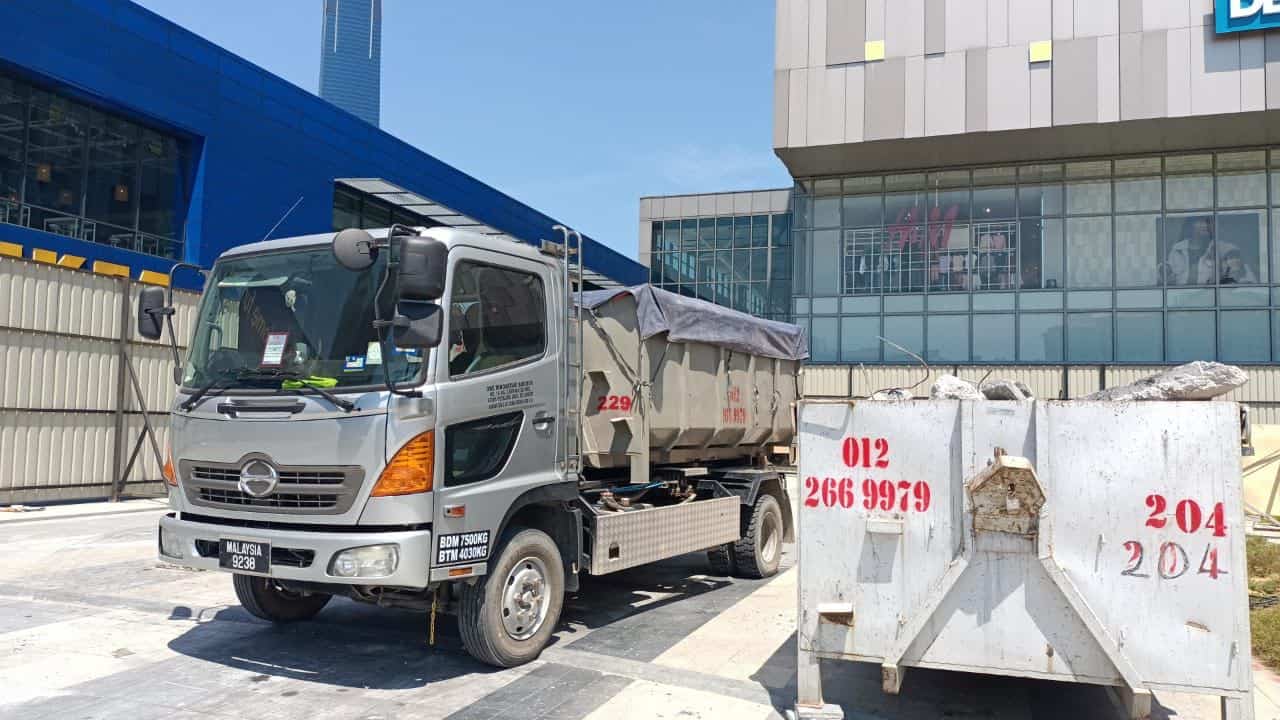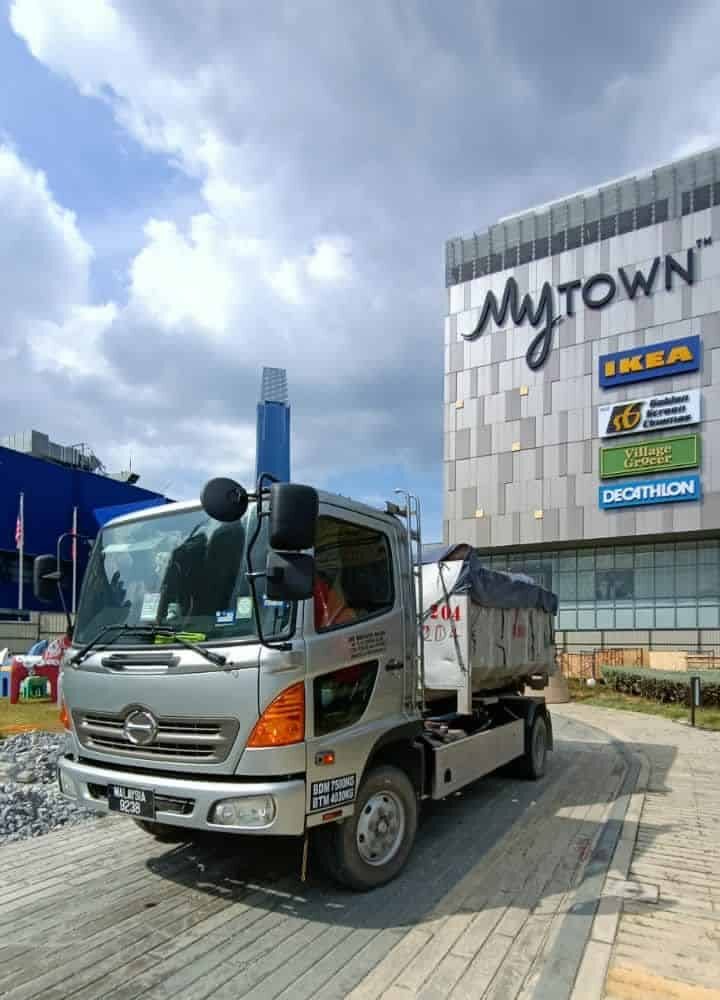RORO BIN RENTAL
Find The Right Size For Your Project

Small Roro Bin
Dimensions: 12′ (L) X 6′ (W) X 2.5′ (H)
Best Use: Heavy construction and demolition waste like concrete and soil.

Large Roro Bin
Dimensions: 12′ (L) X 6′ (W) X 4′ (H)
Best Use: Light-weight construction, industrial, commercial waste, furniture, household bulky waste, trees and etc.

Domestic Roro Bin
Dimensions: 12′ (L) X 6′ (W) X 4′ (H) with roof
Best Use: Domestic food waste (Organic waste).

Extra Giant Roro Bin
Dimensions: 16′ (L) X 8′ (W) X 6′ (H)
Best Use: Light-weight construction, industrial, commercial waste, furniture, household bulky waste, trees and etc.

Giant Roro Bin
Dimensions: 14′ (L) X 7′ (W) X 5.5′ (H)
Best Use: Light-weight construction, industrial, commercial waste, furniture, household bulky waste, trees and etc.
WHAT MAKES US DIFFERENT ?

Value Price

Express Service

Licensed Under Local Authorities

Quick Scheduling
TESTIMONIALS
OUR CLIENTS







PROJECT REFERENCE









Understanding Disposal Services
In today’s world, where waste is piling up faster than we can manage, disposal services play a crucial role in keeping our surroundings clean, healthy, and safe. If you’ve ever wondered how all the waste from homes, offices, and industries is managed, disposal services are the unsung heroes working behind the scenes to make it happen. Let’s dive into everything you need to know about disposal services – from the types and importance to the sustainable options and challenges faced in the industry.
What Are Disposal Services?
Disposal services encompass a range of activities that involve the collection, transportation, and safe disposal of various types of waste. These services cater to households, businesses, and large industries, ensuring that waste is handled responsibly.
Definition of Disposal Services
Disposal services refer to professional services that collect, sort, and dispose of waste materials, including household waste, hazardous chemicals, and recyclable items.
The Purpose of Disposal Services
The main goal of disposal services is to prevent waste accumulation that can lead to environmental hazards. These services aim to recycle materials where possible, reduce pollution, and ensure that hazardous waste is managed in a way that minimizes health risks.
Types of Disposal Services
Disposal services are not a one-size-fits-all solution. They come in various forms, catering to different needs and types of waste.
Waste Collection and Disposal
Basic waste collection and disposal services involve the collection of general waste from households and businesses. This waste is typically taken to landfills or incineration facilities.
Hazardous Waste Disposal
Hazardous waste disposal is specifically designed to handle materials that pose environmental or health risks, such as chemicals, medical waste, and toxic substances. Special precautions are taken to handle these safely.
Recycling and Sustainable Disposal Options
Recycling services focus on reusing materials like paper, plastic, and glass, helping to conserve natural resources and reduce landfill use.
Electronic Waste Disposal
As technology advances, electronic waste disposal has become vital. This service safely handles e-waste like old phones, computers, and batteries, which often contain hazardous components.
Why Are Disposal Services Important?
The benefits of proper disposal services go beyond cleanliness – they’re essential for health, safety, and the environment.
Environmental Impact of Improper Disposal
Without proper disposal, waste materials can contaminate soil and water, leading to significant environmental damage. Disposal services help mitigate these risks by ensuring waste is managed safely.
Health and Safety Concerns
Accumulated waste can attract pests and harmful bacteria, posing risks to public health. Disposal services reduce these risks by regularly collecting and managing waste.
Legal Compliance and Regulations
Many countries have strict regulations on waste management, especially concerning hazardous waste. Disposal services help individuals and businesses comply with these regulations, avoiding potential fines and penalties.
How Disposal Services Operate
Ever wondered how your trash ends up in the right place? Here’s a step-by-step breakdown of how disposal services operate.
Step-by-Step Disposal Process
The disposal process generally involves collection, transportation, sorting, and finally, safe disposal. Waste is often separated into recyclable and non-recyclable categories.
Transportation and Sorting of Waste
After collection, waste is transported to a facility where it’s sorted. This step is crucial for separating recyclable materials from those meant for disposal.
Final Disposal Methods (Landfills, Incineration, Recycling)
Depending on the type of waste, it may be taken to a landfill, incinerated, or sent to a recycling center. Each method has pros and cons, with recycling being the most eco-friendly option.
Sustainable and Green Disposal Solutions
Eco-friendly disposal options are on the rise, with more people and companies opting for sustainable practices.
Composting as an Eco-Friendly Option
Composting is an excellent way to turn organic waste into nutrient-rich soil, reducing the amount of waste sent to landfills.
The Role of Recycling Centers
Recycling centers are essential in giving waste materials a second life, helping conserve resources and reduce the environmental footprint.
How You Can Contribute to Sustainable Disposal
Individuals can also make a difference by recycling, composting, and reducing waste at the source.
Disposal Services for Businesses and Industries
Disposal needs vary across sectors, with industrial and commercial spaces requiring specialized services.
Industrial Waste Management
Large industries produce substantial waste that requires specialized disposal services, especially for materials like metals, chemicals, and other hazardous substances.
Commercial Disposal Needs
Offices, restaurants, and retail stores also need efficient waste management solutions, including regular pick-ups and recycling options.
Reducing Waste in the Corporate Sector
Many businesses are adopting sustainable practices to minimize waste, from using recyclable materials to composting food waste.
Common Challenges in Disposal Services
Disposal services face numerous challenges, from handling hazardous materials to infrastructure limitations.
Handling Hazardous Waste
Managing hazardous waste safely is one of the biggest challenges in the industry, requiring specialized training and equipment.
Overcoming Infrastructure Limitations
In some areas, lack of infrastructure for recycling and disposal can lead to illegal dumping and environmental hazards.
Public Awareness and Participation
Public involvement is key to a successful waste management system, and increasing awareness can improve recycling rates.
Future of Disposal Services
What does the future hold for disposal services? Emerging trends suggest a move toward zero-waste and tech-driven solutions.
Technological Advancements in Waste Management
Technologies like AI and automation are helping disposal services become more efficient and eco-friendly.
Embracing a Zero-Waste Culture
Many cities are aiming to achieve zero-waste status, encouraging residents and businesses to reduce, reuse, and recycle.
Disposal services are an essential part of maintaining a clean and healthy environment. With various options, from basic waste collection to specialized hazardous waste handling, these services are crucial for individuals, businesses, and industries alike. As we move toward a sustainable future, embracing eco-friendly disposal methods can make a significant difference in our collective environmental impact.


